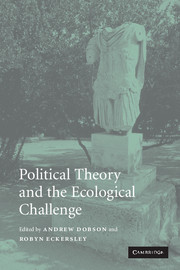8 - Democracy
Published online by Cambridge University Press: 06 July 2010
Summary
Several years ago I participated in a round table discussion on ‘Our Responsibilities Toward Future Generations’ at a small liberal arts college in the American midwest. One of my fellow discussants was a theologian, the other a state legislator. Despite our differences, we all agreed that we do not pay sufficient heed to the health and wellbeing of our distant descendants and that this represents a kind of moral myopia that calls for correction. Sometime during the discussion I turned to the state legislator – a thoughtful and sensitive man of enlightened outlook – and asked him point-blank why our elected representatives don't pay much (if any) attention to the fate of future people, and still less to that of non-human creatures. ‘Because they don't vote’, was his prompt reply. (He might have added that future people and animals don't contribute money to political campaigns either.)
That, in a nutshell, sums up one of the chief shortcomings of democracy, at least from an environmental or green perspective. I should perhaps qualify this by saying that I am talking about democracy as presently understood.
- Type
- Chapter
- Information
- Political Theory and the Ecological Challenge , pp. 131 - 147Publisher: Cambridge University PressPrint publication year: 2006
References
- 22
- Cited by



